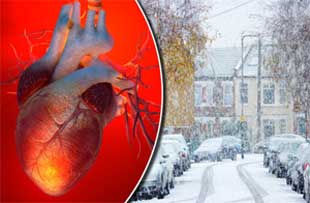- Home
- Editorial
- News
- Practice Guidelines
- Anesthesiology Guidelines
- Cancer Guidelines
- Cardiac Sciences Guidelines
- Critical Care Guidelines
- Dentistry Guidelines
- Dermatology Guidelines
- Diabetes and Endo Guidelines
- Diagnostics Guidelines
- ENT Guidelines
- Featured Practice Guidelines
- Gastroenterology Guidelines
- Geriatrics Guidelines
- Medicine Guidelines
- Nephrology Guidelines
- Neurosciences Guidelines
- Obs and Gynae Guidelines
- Ophthalmology Guidelines
- Orthopaedics Guidelines
- Paediatrics Guidelines
- Psychiatry Guidelines
- Pulmonology Guidelines
- Radiology Guidelines
- Surgery Guidelines
- Urology Guidelines
Heart attacks more lethal during winters

The study was conducted by Arvin Krishnamurthy, a cardiologist at Leeds General Infirmary, Leeds, England and colleagues to determine the impact of weather on the outcome of heart attack patients.
Cardiac arrest is when the heart suddenly stops pumping blood around the body, while cardiogenic shock is when the heart can't pump enough blood to meet the body's needs. Both conditions are often caused by a severe heart attack, but not everyone who has a heart attack has a cardiac arrest or cardiogenic shock.
For the study, the researchers compared information from 4,056 people who received treatment for a heart attack in four separate years.
Key Findings:
- The most severe heart attacks were more deadly in the coldest six months, compared to the warmest.
- The overall number of heart attacks was roughly the same in the coldest half of the year, compared to the warmer months (52% between November and April), with the most serious heart attacks leading to cardiac arrest and cardiogenic shock.
- The risk of dying within 30 days of a severe heart attack was nearly 50% higher in the six coldest months, compared to the six warmest months (28% vs 20%).
"There is no physical reason why a heart attack, even the most severe, should be more deadly in winter than in summer so we must do further research to find the cause of this difference and remedy it. The next step is to find out if this trend is seen nationwide, said Dr. Krishnamurthy.
"Potential explanations could include longer time to treatment, prolonged hospitalization and delays to discharge, and increased prevalence of winter-associated infections, which in the sickest patients, could be potentially lethal.
"Further studies interrogating the association between time of admission and outcomes, especially in the sickest and most vulnerable patients, are certainly warranted.
Professor Metin Avkiran, Associate Medical Director at the British Heart Foundation, said: "You obviously can't choose when you have a major heart attack, but it shouldn't have such an impact on your chances of surviving. It's vital we carry out more research to find out why there are these differences, as well as continuing to do all we can to stop people having heart attacks in the first place.
"Although we've made huge strides in the last 50 years, we must urgently fund more research to continue to drive down the number of heart attacks and ensure more people can live full lives even after a heart attack."

Disclaimer: This site is primarily intended for healthcare professionals. Any content/information on this website does not replace the advice of medical and/or health professionals and should not be construed as medical/diagnostic advice/endorsement or prescription. Use of this site is subject to our terms of use, privacy policy, advertisement policy. © 2020 Minerva Medical Treatment Pvt Ltd